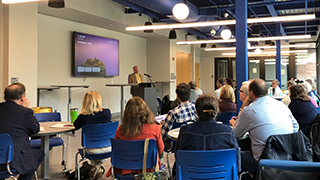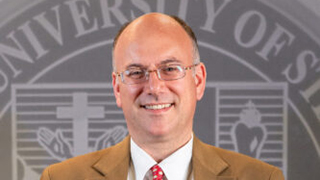Faculty Reflect on Scripture and Scholarship at 27th Summer Seminar
Tuesday, June 17, 2025
 Seton Hall University welcomed over thirty faculty from across disciplines for the
27th Annual Summer Seminar, “The Living Word of God: Still Alive Today,” an enriching
three-day event centered on engaging academic disciplines through the lens of the
Catholic Intellectual Tradition. This seminar has been offered to Seton Hall faculty
for nearly thirty years, co-sponsored by the Center for Catholic Studies and the Center
for Vocation and Servant Leadership.
Seton Hall University welcomed over thirty faculty from across disciplines for the
27th Annual Summer Seminar, “The Living Word of God: Still Alive Today,” an enriching
three-day event centered on engaging academic disciplines through the lens of the
Catholic Intellectual Tradition. This seminar has been offered to Seton Hall faculty
for nearly thirty years, co-sponsored by the Center for Catholic Studies and the Center
for Vocation and Servant Leadership. The 2025 seminar featured Jeffrey Morrow, Ph.D., professor of Theology at Franciscan
University of Steubenville and former faculty member at Seton Hall’s Immaculate Conception
Seminary School of Theology. Morrow, who is fondly remembered by many for his dynamic
teaching in both the Seminary as well as Core I and Core II courses, returned to campus
to lead this year’s sessions.
The 2025 seminar featured Jeffrey Morrow, Ph.D., professor of Theology at Franciscan
University of Steubenville and former faculty member at Seton Hall’s Immaculate Conception
Seminary School of Theology. Morrow, who is fondly remembered by many for his dynamic
teaching in both the Seminary as well as Core I and Core II courses, returned to campus
to lead this year’s sessions.
Drawing on his expertise in Scripture and Biblical Studies, Morrow guided participants
through discussions and reflections aimed at deepening their understanding of how
to read and teach Scripture across a variety of academic contexts. Faculty explored
not only pedagogical strategies but also the broader intellectual and spiritual benefits
that come from helping students engage meaningfully with Sacred Scripture.
Attendees included faculty from a wide range of disciplines, with particularly strong
participation from those involved in the University Core. The seminar fostered lively
dialogue, intellectual collaboration, and renewed inspiration for integrating faith
and reason in the classroom.
DAY 1 – A Look at the Historicity of Sacred Scripture
During the first day of the seminar, Morrow’s explored the historical reliability
of both Old and New Testament Scriptures, addressing common student concerns and misconceptions
about the Bible. One of the first issues he tackled was the idea that the Bible cannot
be trusted due to the number of times it has been translated, a claim he called overly
simplistic. He further described how students express a desire to believe in the Bible
but struggle to find a rational basis for that belief, while others view the Scriptures
as nothing more than moral fables, akin to Aesop’s tales, with no meaningful engagement
with the actual texts.
Morrow acknowledged the challenges in historical scholarship, one of which being that
only a small portion of history has been excavated, an even smaller portion studied
and published, and only fragments of that reach the broader public. He stressed, however,
that the "absence of evidence cannot be equated with evidence of absence," particularly
when reading Scripture. He explained that one of the most compelling arguments for
the historical credibility of Scripture is that it does not shy away from the failings
of its central figures. Unlike many religious texts, the Bible presents deeply human
and flawed individuals, such as King David and Simon Peter, without downplaying their
shortcomings. Furthermore, all four gospels record that women were the first witnesses
of the resurrected Jesus. Given that women's testimony was not considered reliable
in the cultural context of the time, this detail would have been detrimental to the
story’s credibility if it were fabricated, yet it is consistently included.
Finally, Morrow discussed how the apocryphal gospels lack historical grounding, as
evidenced by their inauthentic use of names and cultural markers. In contrast, canonical
texts show a familiarity with the period, including subtle but significant naming
conventions. For instance, common names like Simon are often clarified to avoid confusion,
whereas rarer names like Bartholomew require no such distinction, reflecting a historically
grounded practice of disambiguation.
DAY 2 – A Catholic Interpretation of Scripture
On Day 2, the focus shifted toward the Catholic interpretation of Scripture, guided
primarily by Dei Verbum, the Second Vatican Council’s Dogmatic Constitution on Divine Revelation. This document
represents a pivotal development in the Church’s approach to the Bible, taking the
rich tradition of Catholic scriptural interpretation and bringing it into dialogue
with the modern intellectual climate of the 1960s. Morrow emphasized Dei Verbum is not primarily a response to criticism or skepticism, but a text that seeks to clarify
and illuminate the Church’s understanding of the Word of God, revealing its depth
and beauty.
Within this theological framework, Dei Verbum outlines the proper senses of Scripture, beginning with the literal sense — the meaning
intended by the human author and grounded in the historical context. All other senses
are built upon this literal foundation. The spiritual sense is then divided into three
parts: the typological (or allegorical), the moral (or tropological), and the anagogical.
Typology involves recognizing how people, events, and institutions in the Old Testament
foreshadow and find fulfillment in the New Testament. The moral sense encourages readers
to discern how a passage might speak to their personal lives and ethical choices.
The anagogical sense points toward eternal realities, inviting contemplation of heavenly
realities.
Morrow also emphasized the posture that scholars should adopt when approaching difficult
or confusing passages in Scripture. Rather than questioning the veracity of the text
outright, scholars are called to reflect on their own understanding and assumptions.
Furthermore, it is essential to respect the original audiences of Scripture, those
who, immersed in their historical and cultural context, would have grasped nuances
that modern readers might miss. Through Dei Verbum, Catholic scholars are reminded that the study of Scripture is ultimately a sacred
task, one that leads not only to knowledge but to encounter with Christ himself.
DAY 3 – Why Teaching and Learning Scripture is Important at Seton Hall
In the ongoing conversations about teaching Scripture in today's classroom, several
key themes have emerged, especially around how we engage students, Catholic or not,
in a meaningful encounter. Morrow opened the discussion by reflecting on the role
of artificial intelligence in education and how educators might thoughtfully respond
to emerging technologies like ChatGPT and Grammarly. Many participants noted that
these tools risk diminishing students’ critical thinking and deeper engagement with
texts. This concern is especially relevant when teaching Scripture, which demands
not only intellectual engagement but also an openness to personal reflection.
Morrow remarked that the heart of studying Scripture is to encounter God. Among the
various religious traditions held in the classroom, faculty agreed that Scripture
still holds power for all students, as it speaks to a universal call to purpose and
vocation. Faculty members shared various approaches for encouraging engagement with
Scripture: some professors incorporate music and pop culture to bridge the gap between
ancient texts and modern sensibilities, while others tie biblical themes to hot topic
issues such as diversity and politics, helping students see the relevance of Scripture
in their everyday lives.
Mental health emerged as a pressing concern with several professors noting that their
students are experiencing high levels of anxiety, stress, and emotional exhaustion,
both inside and outside the classroom. Morrow asked how faculty are supporting students
through these challenges. One participant acknowledged the limits of her role, emphasizing
the importance of referring students to trained counselors when appropriate. This
highlighted the need for educators to be both supportive and professionally responsible,
aware of what lies within their scope of practice.
Returning to pedagogy, Morrow asked how Scripture can be compelling for students today.
Several faculty members emphasized the importance of letting the text speak for itself,
trusting that these sacred writings have endured because they speak across time. Others
shared their practice of allowing room for students to wrestle with confusion, inconsistencies,
and difficult passages, creating space for honest dialogue. In doing so, professors
model a posture of reverence, inquiry, and openness, one that invites all students
into a transformative engagement with Scripture.
Looking Forward
The Center for Catholic Studies along with the Center for Vocation and Servant Leadership
will continue to offer these seminars in the future, with a different topic, focus
and guest speaker each year. The seminar is always free and open to faculty from all
disciplines. For more information about the seminar, or to get involved in this or
similar programming, please contact [email protected].
Categories: Education, Faith and Service






